Understanding Duplicate Pages:
Duplicate pages refer to multiple instances of the same or similar content on a website. These duplicates can arise due to various reasons, such as technical issues, site configuration, or intentional actions by site owners. Regardless of the cause, duplicate pages can have adverse effects on search engine rankings, organic traffic, and user engagement.
Causes of Duplicate Pages in WordPress:
- URL Parameters: Websites often use URL parameters to track user activities or enable dynamic content. If these parameters are not handled correctly, search engines may perceive different URLs as separate pages, leading to duplication.
- Pagination: Pagination is commonly used to divide long content into multiple pages. However, improper configuration of pagination can result in duplicate content issues.
- Trailing Slashes: Inconsistent use of trailing slashes in URLs can create duplicate pages.
- WWW vs. non-WWW: Failing to redirect non-preferred versions of a website (with or without the "www" prefix) can cause duplicate content problems.
- HTTP vs. HTTPS: If both HTTP and HTTPS versions of a website are accessible, search engines may view them as separate entities and penalize for duplicate content.
- Content Syndication: When content is republished on multiple websites without proper canonicalization, duplicate pages can arise.
- Tag and Category Archives: WordPress generates archive pages for tags and categories, which may result in duplicate content if not properly managed.
- Printer-friendly Pages: Printer-friendly versions of web pages can inadvertently create duplicates if not handled correctly.
Impact of Duplicate Pages:
- SEO Dilution: Search engines struggle to determine which version of a duplicate page should be ranked, resulting in diluted search engine optimization (SEO) efforts and reduced organic traffic.
- Ranking Penalties: Duplicate content can lead to search engine penalties, causing a drop in search rankings or even removal from search results.
- User Confusion: When users encounter identical or similar content across different URLs, it can lead to confusion, frustration, and a negative user experience.
- Backlink Dilution: If external websites link to multiple versions of the same content, it can dilute the SEO value of backlinks, reducing their impact.
- Wasted Crawl Budget: Search engine crawlers have a finite budget for crawling websites. Duplicate pages consume this budget, limiting the indexing of valuable content.
Solutions to Address Duplicate Pages:
- Canonicalization: Implementing canonical tags helps indicate the preferred version of a page to search engines, consolidating duplicate content signals.
- URL Parameters Handling: Use tools like Google Search Console or WordPress plugins to instruct search engines to ignore specific URL parameters or set them as canonical.
- Pagination Best Practices: Properly configure pagination with rel="next" and rel="prev" tags to consolidate content across multiple pages.
- Redirections: Set up 301 redirects to ensure consistent URL structure (e.g., redirecting non-www to www or HTTP to HTTPS).
- Content Syndication: Use canonical tags or meta robots tags to indicate the original source of the content when syndicating it.
- Noindex Tag for Archives: Use noindex tags on tag and category archive pages to prevent search engines from indexing them.
- Site Auditing: Regularly audit your website using tools like Screaming Frog or SEMrush to identify and resolve duplicate content issues.
Conclusion:
Duplicate pages WordPress can have far-reaching consequences, including reduced search engine rankings, poor user experience, and wasted resources. By understanding the causes of duplication and implementing effective solutions like canonicalization, URL parameter handling, and proper redirections, website owners can ensure their content remains unique and optimized for search engines. By taking proactive measures to address duplicate pages, WordPress users can enhance their website's performance, attract organic traffic, and provide a seamless experience to their visitors.










